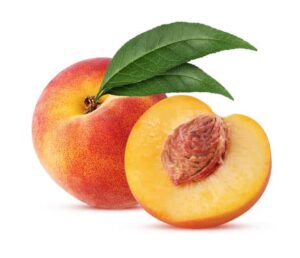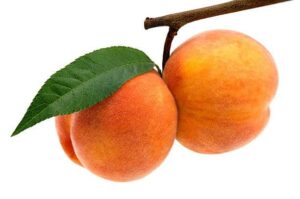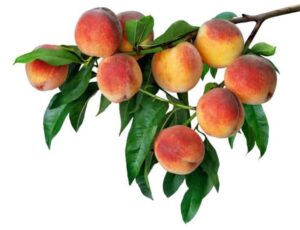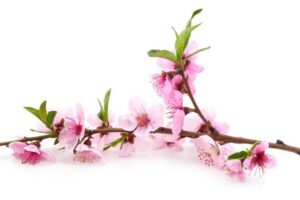Peaches are not just delicious; they also pack a powerful punch of health benefits. These sweet, juicy fruits have been enjoyed for centuries and have been the subject of numerous scientific studies. In this article, we will explore the scientific evidence behind the health benefits of consuming peaches.
Rich in Nutrients
 Peaches are an excellent source of essential nutrients. They are low in calories, fat-free, and provide significant amounts of vitamins and minerals. A medium-sized peach contains vitamins A, C, and E, as well as dietary fiber, potassium, and various B vitamins.
Peaches are an excellent source of essential nutrients. They are low in calories, fat-free, and provide significant amounts of vitamins and minerals. A medium-sized peach contains vitamins A, C, and E, as well as dietary fiber, potassium, and various B vitamins.
Reference:
- “Bioactive Compounds in Peaches (Prunus persica) and Their Health Implications,” published in the journal Nutrients, 2016.
Antioxidant Power
Peaches are renowned for their antioxidant content. Antioxidants help protect the body from harmful free radicals, reducing the risk of chronic diseases. The presence of compounds like beta-carotene and quercetin in peaches contributes to their antioxidant activity.
What makes peaches even more remarkable is that these antioxidants are not just limited to the flesh; they are also found in the skin, making it a beneficial habit to enjoy the entire fruit for the maximum health benefits.
Furthermore, the combination of various antioxidants in peaches creates a synergistic effect, enhancing their overall protective power against oxidative stress.
Reference:
- “Antioxidant Capacity, Total Phenolics, and Ascorbic Acid Content of Non-Citrus Fruit and Vegetable Juices and Drinks,” published in the Journal of Food Composition and Analysis, 2002.
Improved Digestive Health
Peaches are a good source of dietary fiber, which supports healthy digestion. The fiber content aids in preventing constipation and maintaining a healthy digestive tract. It can also contribute to weight management by promoting a feeling of fullness.
Peaches stand out for their unique combination of dietary fiber and natural enzymes. This distinctive profile not only supports regular bowel movements and a well-functioning digestive system but also assists in breaking down food more efficiently, ensuring that your body absorbs essential nutrients optimally.
Furthermore, the natural sweetness of peaches can make fiber-rich foods more appealing, promoting digestive health with a satisfyingly sweet twist.
Reference:
- “Dietary Fiber and Gastrointestinal Disease: A Case-Control Study,” published in The American Journal of Clinical Nutrition, 1990.
Skin Health
 The vitamin C in peaches promotes collagen production, which is essential for healthy, radiant skin. It also helps protect the skin from the damaging effects of UV radiation and may reduce the signs of aging.
The vitamin C in peaches promotes collagen production, which is essential for healthy, radiant skin. It also helps protect the skin from the damaging effects of UV radiation and may reduce the signs of aging.
Furthermore, peaches are uniquely enriched with beta-carotene, a powerful antioxidant that contributes to skin’s natural luminosity and aids in reducing the appearance of blemishes, leaving your skin with a vibrant, youthful glow.
Reference:
- “Role of Vitamin C in Skin Diseases,” published in the International Journal of Cosmetic Science, 2013.
Potential Cancer Prevention
Peaches contain bioactive compounds, such as phenolic acids and carotenoids, which have shown promise in preventing certain types of cancer. These compounds can help combat oxidative stress and inflammation, which are linked to cancer development.
Reference:
- “Phenolic Compounds and Antioxidant Activity in Different Colored Pulp Peaches,” published in the Journal of Food Biochemistry, 2012.
Heart Health
Peaches stand out as a heart-healthy fruit due to their notable combination of potassium and dietary fiber. The high potassium content helps relax blood vessels, reducing the strain on the heart.
Simultaneously, the soluble fiber in peaches not only aids in cholesterol reduction but also promotes a feeling of fullness, which can contribute to weight management, another vital aspect of cardiovascular wellness.
Reference:
- “Effects of Dietary Fiber and Its Components on Metabolic Health,” published in Nutrients, 2010.
Weight Management
 If you’re looking to manage your weight, peaches can be a valuable addition to your diet. These fruits are low in calories and high in fiber, promoting a sense of fullness, which can help control appetite and reduce overeating.
If you’re looking to manage your weight, peaches can be a valuable addition to your diet. These fruits are low in calories and high in fiber, promoting a sense of fullness, which can help control appetite and reduce overeating.
Weight management is not only about calorie intake but also about the quality of the calories consumed. Peaches, with their naturally sweet and satisfying flavor, provide a nutritious alternative to high-calorie snacks, supporting your weight management goals.
Additionally, the high water content in peaches aids in keeping you hydrated, contributing to a feeling of fullness and aiding in portion control, making them an excellent choice for those seeking to maintain a healthy weight.
Reference:
- “Effects of Dietary Fiber and Its Components on Obesity and Metabolic Syndrome,” published in Nutrients, 2013.
Eye Protection
Peaches also contain compounds like lutein and zeaxanthin, which are beneficial for eye health. These carotenoids help protect the eyes from UV damage and may reduce the risk of age-related macular degeneration.
Peaches, with their vibrant and varied skin colors, including the less common red and white varieties, are not only a feast for the palate but also a sight to behold. These different colors signify varying levels of antioxidants and carotenoids, which contribute to their protective benefits for the eyes.
Reference:
- “Carotenoids and the Macula,” published in The Journal of Nutrition, 2002.
Alleviating Inflammation
Inflammation is a root cause of many chronic diseases. The phenolic compounds in peaches possess anti-inflammatory properties, which may help reduce the risk of inflammatory conditions like arthritis and heart disease.
The particularity of peaches lies in the presence of compounds like quercetin and chlorogenic acid, which have demonstrated a remarkable ability to combat inflammation. These bioactive compounds not only reduce inflammation but also exhibit antioxidant properties, further safeguarding against oxidative stress, a key contributor to chronic health conditions.
Reference:
- “Phenolic Compounds and Their Potential Effects on Chronic Diseases,” published in Advances in Experimental Medicine and Biology, 2014.
Supports Immune Function
Peaches’ rich vitamin C content boosts the immune system. A strong immune system is essential for defending the body against infections and illnesses.
Peaches, with their delectable blend of vitamins, antioxidants, and minerals, offer a potent immune-boosting combination. Their natural sweetness and the presence of vitamin C not only bolster the immune system but also provide a refreshing way to enhance your body’s defense mechanisms.
Furthermore, the array of phytonutrients found in peaches, such as beta-carotene and quercetin, work in harmony with vitamin C, creating a harmonious symphony of immune support that can be a delightful addition to your diet.
Reference:
- “Vitamin C and Immune Function,” published in Nutrients, 2017.
Blood Sugar Control
 Peaches have a relatively low glycemic index, meaning they have a minimal impact on blood sugar levels. This makes them a suitable fruit choice for individuals with diabetes or those looking to manage their blood sugar.
Peaches have a relatively low glycemic index, meaning they have a minimal impact on blood sugar levels. This makes them a suitable fruit choice for individuals with diabetes or those looking to manage their blood sugar.
Peaches’ unique combination of low glycemic index and dietary fiber content not only helps in stabilizing blood sugar levels but also in preventing rapid spikes in glucose. This characteristic makes peaches an ideal choice for individuals seeking to manage their blood sugar effectively.
Additionally, the antioxidants in peaches may offer protection to pancreatic cells, further contributing to their potential benefits in supporting blood sugar control.
Reference:
- “Glycemic Index and Glycemic Load Values of Fruits: An Updated Review,” published in Nutrients, 2018.
Hydration
Peaches have a high water content, which contributes to their hydrating properties. Staying well-hydrated is essential for overall health, as it supports various bodily functions, including digestion, circulation, and temperature regulation.
Reference:
- “Water, Hydration and Health,” published in Nutrition Reviews, 2010.
Aiding in Stress Reduction
The presence of magnesium in peaches is particularly noteworthy. This essential mineral plays a vital role in relaxing blood vessels and muscles, helping to soothe both the body and mind.
Additionally, the act of biting into a juicy, ripe peach can offer a sensory escape, making it an ideal, stress-alleviating choice in the world of fruit.
So, whether you’re enjoying a peaceful moment under a tree filled with ripe peaches or simply savoring a slice of this fruit, the stress-reducing properties of peaches can offer a sweet, natural remedy for life’s everyday pressures.
Reference:
- “The Role of Magnesium in Neurological Disorders,” published in Nutrients, 2018.
Promoting Bone Health
The presence of vitamins A and C in peaches contributes to bone health. Vitamin C is involved in collagen formation, an essential component of bones, while vitamin A supports the development and maintenance of healthy bones.
In addition to vitamins A and C, peaches contain vital minerals like potassium and magnesium, which play a crucial role in maintaining bone density and strength. These minerals, combined with the vitamins found in peaches, make them a particularly delicious and wholesome choice for those looking to fortify their skeletal well-being.
Reference:
- “Vitamin A and Bone Health,” published in Nutrition, 2010.
Potential Anti-Aging Benefits
Peaches’ antioxidant properties extend to protecting the skin from premature aging caused by UV rays and environmental pollutants. Regular consumption may contribute to a more youthful appearance.
Peaches stand out in the realm of anti-aging due to their rich content of carotenoids, like beta-carotene, lutein, and zeaxanthin, which are potent antioxidants. These compounds have the remarkable ability to neutralize harmful free radicals, offering a natural defense against skin damage, fine lines, and age-related skin conditions.
Additionally, the high water content in peaches helps keep the skin hydrated and plump, contributing to a youthful, radiant complexion. So, savoring the sweet, juicy goodness of peaches not only tantalizes your taste buds but also nurtures your skin from within, providing an extra layer of protection against the signs of aging.
Reference:
- “Antioxidants in Skin Health and Disease,” published in Clinics in Dermatology, 2010.
Nutritional value per 100 grams of peaches
- Calories: 39 kcal
- Water: 89.1 grams
- Protein: 0.91 grams
- Carbohydrates: 9.54 grams
- Sugars: 8.39 grams
- Dietary Fiber: 1.5 grams
- Fat: 0.25 grams
- Vitamins and Minerals:
- Vitamin A: 326 IU (7% of the Daily Value, DV)
- Vitamin C: 9.9 mg (17% of the DV)
- Vitamin E: 0.73 mg (4% of the DV)
- Vitamin K: 2.6 µg (3% of the DV)
- Vitamin B6: 0.025 mg (1% of the DV)
- Folate: 4 µg (1% of the DV)
- Potassium: 190 mg (5% of the DV)
- Magnesium: 9 mg (2% of the DV)
- Phosphorus: 11 mg (2% of the DV)
- Calcium: 6 mg (1% of the DV)
- Iron: 0.25 mg (1% of the DV)
- Copper: 0.086 mg (4% of the DV)
These values are approximate and can vary based on factors such as the peach variety, ripeness, and cultivation conditions. The Daily Value (DV) percentages are based on a 2,000-calorie daily intake. Keep in mind that these values are for raw peaches, and cooking or processing can alter the nutrient content.
If you’re looking for a delightful dessert that encapsulates the essence of summer, Jamie Oliver’s “Peaches & Cream Pie” is a symphony of flavors and textures that will transport your taste buds to sun-kissed orchards. This delectable pie marries the natural sweetness of ripe, juicy peaches with the lusciousness of cream, all nestled in a perfectly baked crust.
Conclusion:
Incorporating peaches into your diet can offer a wide range of health benefits, from promoting digestive health and radiant skin to supporting heart health and reducing the risk of chronic diseases. Their nutrient-rich profile, coupled with their delicious taste, makes them a valuable addition to your daily meals and snacks. However, it’s essential to remember that a balanced diet that includes a variety of fruits and vegetables is key to overall well-being. So, the next time you enjoy a succulent peach, relish not only the taste but also the healthful advantages it provides.
Contraindications for Peach Consumption
While peaches are generally considered a healthy and delicious fruit, there are a few contraindications or situations where individuals should exercise caution or avoid their consumption. Here are some common contraindications to consuming peaches in English:
Allergic Reactions: Some individuals may be allergic to peaches or other fruits in the same family, like apricots or cherries. Peach allergies can manifest as itching, swelling, hives, or more severe reactions, and those with known allergies should avoid peaches.
Oral Allergy Syndrome: People with pollen allergies, such as birch pollen, may experience oral allergy syndrome when consuming peaches. It can cause itching or swelling of the mouth and throat.
Kidney Stones: Peaches are a source of oxalates, which can contribute to the formation of kidney stones in susceptible individuals. If you have a history of kidney stones, it may be best to limit peach consumption.
High-Fructose Intolerance: Some people with fructose malabsorption or hereditary fructose intolerance may experience digestive discomfort when consuming high-fructose fruits like peaches.
Medication Interactions: Peaches contain compounds that may interact with certain medications. For example, compounds in peaches can interfere with some anticoagulants and blood pressure medications. If you are on medication, it’s advisable to consult a healthcare professional.
Diabetic Diet: While peaches are relatively low in sugar compared to some fruits, they should still be consumed in moderation by individuals with diabetes due to their carbohydrate content.
Gastroesophageal Reflux Disease (GERD): The acidity of peaches may exacerbate symptoms of GERD or acid reflux in some individuals. It’s best to monitor your own tolerance and avoid peaches if they worsen your symptoms.
Infant and Toddler Caution: For babies and young children, whole peaches can pose a choking hazard. It’s recommended to serve small, well-cooked peach slices or puree for very young children.
Pesticide Residues: Peaches are often treated with pesticides, and individuals with chemical sensitivities may want to choose organic peaches to reduce their exposure to pesticide residues.
Always consult a healthcare professional or registered dietitian if you have specific health concerns or dietary restrictions. They can provide personalized advice based on your individual health needs and circumstances.
Fascinating Facts About Peaches
A Symbol of Immortality:
In Chinese culture, peaches have long been associated with immortality. The peach tree of immortality is said to produce peaches every 3,000 years, and consuming them is believed to grant eternal life.
Origin Shrouded in Mystery:
The exact origin of the peach remains uncertain, but it’s widely believed to have originated in China more than 8,000 years ago. From there, it spread to Persia, and later, to Europe and the Americas.
Close Relatives of Roses:
Peaches belong to the rose family, Rosaceae. This botanical connection explains the delicate, fragrant blossoms of peach trees that resemble miniature roses.
Multiple Varieties:
Peaches come in an impressive array of varieties, each with unique characteristics. These range from the clingstone peach, where the flesh sticks to the pit, to the freestone peach, which easily separates from the pit.
The Fuzz Factor:
Peaches are well-known for their fuzzy skin, but there are also fuzz-less or “naked” peach varieties that have a smooth skin. These fuzz-less peaches are often preferred for fresh eating.
Colorful Personalities:
Peaches can have various skin colors, including the more common yellow and orange, as well as rarer red and white varieties. The color often corresponds to the sweetness and flavor of the peach.
Peachy Nutritional Benefits:
Apart from being delicious, peaches are rich in vitamins A and C, dietary fiber, and antioxidants. They contribute to skin health, digestion, and protection against free radicals.
A Southern Specialty:
The U.S. state of Georgia is renowned for its peaches. In fact, Georgia is often called the “Peach State” and celebrates the peach with an annual Peach Festival.
Folklore and Legends:
In ancient Greece, it was believed that the peach had the power to ward off evil spirits. Today, peaches often feature in folklore, symbolizing longevity, prosperity, and protection.
Historical Significance:
Peaches have been celebrated in history. The first recorded peach orchard in America was planted in the early 17th century in what is now Virginia.
Natural Moth Repellent:
Did you know that peach trees naturally produce a chemical compound called coumarin, which is used as a natural moth repellent? The presence of coumarin in peach leaves and bark deters certain insects from harming the tree.
The Peach Pit Puzzle:
Peach pits, also known as stones, are well-known for their hard, wood-like shell. What’s fascinating is that these pits contain a small seed inside, which, when cracked open, bears a resemblance to an almond. In fact, peach seeds are sometimes used as a substitute for almonds in recipes.
Heated Peaches:
Applying gentle heat to peaches can intensify their flavor. Grilling or roasting peaches caramelizes their natural sugars, resulting in a more complex and sweeter taste. They are a fantastic addition to both sweet and savory dishes.
Historical Symbolism:
In ancient China, the peach was not only associated with immortality but was also believed to have protective powers. Taoist mythology includes stories of peaches that could give you the ability to see spirits and ward off demons.
Bellini Origin:
The Bellini, a popular cocktail made with peach puree and sparkling wine, was created in the 1930s by the founder of Harry’s Bar in Venice, Italy, Giuseppe Cipriani. He named it after the Italian Renaissance painter Giovanni Bellini because the cocktail’s pink color was reminiscent of a pink toga often featured in Bellini’s paintings.
Largest Peach Cobbler:
The city of Fort Valley, Georgia, holds an annual Peach Festival and bakes the world’s largest peach cobbler to celebrate. This colossal cobbler uses over 75 gallons of peaches, 90 pounds of butter, and 150 pounds of sugar!
Peach as a Musical Instrument:
In the world of music, the term “peach” is sometimes used as slang for a musical instrument. So, when musicians talk about “peachy” sounds, they might be referring to something melodious and sweet.
Astronomical Influence:
Astronomers have named a region of the moon’s surface “Peach” due to its shape and color. In a way, peaches even have an astronomical connection!
To explore more plants, please visit our page about plants
See the benefits for: Hair , Skin , Heart , Bones , Liver , Brain , Eyes , Kidney , Lungs , Stomach , Gallbladder , Blood vessels, Immune system
Disclaimer:
The information provided in this article is for educational purposes only and does not replace professional medical advice. Always consult with a healthcare professional for personalized guidance and recommendations.
